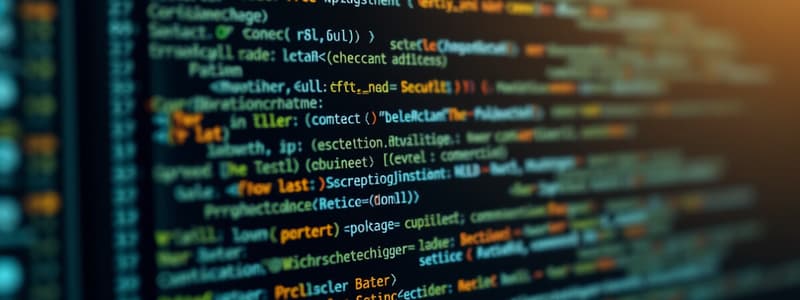Podcast
Questions and Answers
What are the basic components of a computer?
What are the basic components of a computer?
Hardware, Software, Peopleware, Dataware, Procedure
Which of the following is considered an input device?
Which of the following is considered an input device?
Which of the following describes the difference between data and information?
Which of the following describes the difference between data and information?
Computers are known for their ability to produce inconsistent results.
Computers are known for their ability to produce inconsistent results.
Signup and view all the answers
What is the primary use of output devices?
What is the primary use of output devices?
Signup and view all the answers
Which of the following is a disadvantage of computers?
Which of the following is a disadvantage of computers?
Signup and view all the answers
The _____ device allows the user to enter data.
The _____ device allows the user to enter data.
Signup and view all the answers
What is primary memory used for?
What is primary memory used for?
Signup and view all the answers
RAM is an example of secondary memory.
RAM is an example of secondary memory.
Signup and view all the answers
Study Notes
Overview of Computer Programming and Problem Solving
- Basic computer concepts encompass understanding computers as programmable devices that process data and stored instructions.
- Computer languages vary in syntax and uses, playing crucial roles in software development and problem-solving.
- The history of C programming illustrates its evolution as a widely-used language with significant influence on modern programming.
- Software development follows structured processes to ensure effective problem-solving and program functionality.
- Flowcharting and pseudo-coding serve as visual and textual representations of programming logic, assisting in the design phase.
- Algorithms are step-by-step procedures for calculations or problem resolution, essential in programming.
- C programming introduces foundational coding concepts and syntax critical for beginners.
Learning Objectives
- Identify the core computer concepts and their interaction with programming.
- Understand differences between various programming languages and their applications.
- Employ software development methods effectively to address programming challenges using flowcharts and algorithms.
- Transform mathematical formulas into practical algorithms and flowcharts for implementation.
- Analyze and debug program errors while tracing program execution flow.
Basic Computer Concepts
- Computers function as programmable devices that process input data, execute instructions, and produce output results.
Data vs Information
- Data represents raw and unprocessed items lacking intrinsic meaning.
- Information consists of processed data that holds significance and can be utilized for decision-making.
Advantages of Computers
- Speed: Superior data processing capabilities compared to human operators, managing tasks and data efficiently.
- Reliability: Modern electronic components exhibit high dependability with minimal failure rates.
- Consistency: Uniform results are produced under the same inputs and processes, minimizing errors.
- Storage: Ability to hold vast amounts of data, accessible at any time for processing.
- Communication: Facilitates inter-computer connectivity, enabling user interaction.
Disadvantages of Computers
- Privacy Concerns: Risks of identity theft and unprotected personal information leading to privacy violations.
- Public Safety: Sharing personal details online exposes individuals to potential risks and crimes.
- Labor Market Impact: Technological advancements can lead to both job creation and job loss, necessitating ongoing skill development.
- Health Risks: Improper or excessive computer usage can result in physical health issues.
- Environmental Impact: Computer production and disposal contribute to resource depletion and pollution.
Von Neumann Architecture
- A foundational design for computer architecture emphasizing data and program storage, contributing to modern computing.
Major Components of a Computer
- Hardware: The physical components of a computer system.
- Software: The programs and applications running on the hardware.
- Peopleware: Users managing and interacting with the system.
- Dataware: The information processed by the computer.
- Procedure: The methodologies guiding the operation and usage of computer systems.
Hardware Components
- Input Devices: Tools enabling users to enter data, e.g., mouse, keyboard, and microphones.
- Output Devices: Equipment displaying information to users, such as monitors, printers, and speakers.
- Storage Devices: Systems for storing data and instructions, categorized as temporary (like RAM) or permanent (like hard drives).
Anatomy of Memory
- Memory Cell: Basic unit of storage within a computer's memory.
- Address: The specific location identifier of a memory cell.
- Contents: The actual data or instructions stored in a memory cell.
Storage Devices
- Primary Memory: Volatile memory storing data currently in use by the processor, exemplified by RAM.
Studying That Suits You
Use AI to generate personalized quizzes and flashcards to suit your learning preferences.
Related Documents
Description
This quiz covers the fundamentals of programming, focusing on essential computer concepts, programming languages, and the history of C programming. It explores problem-solving techniques including flowcharting, pseudocode, and algorithm design. Test your knowledge in these foundational areas of computer science.




